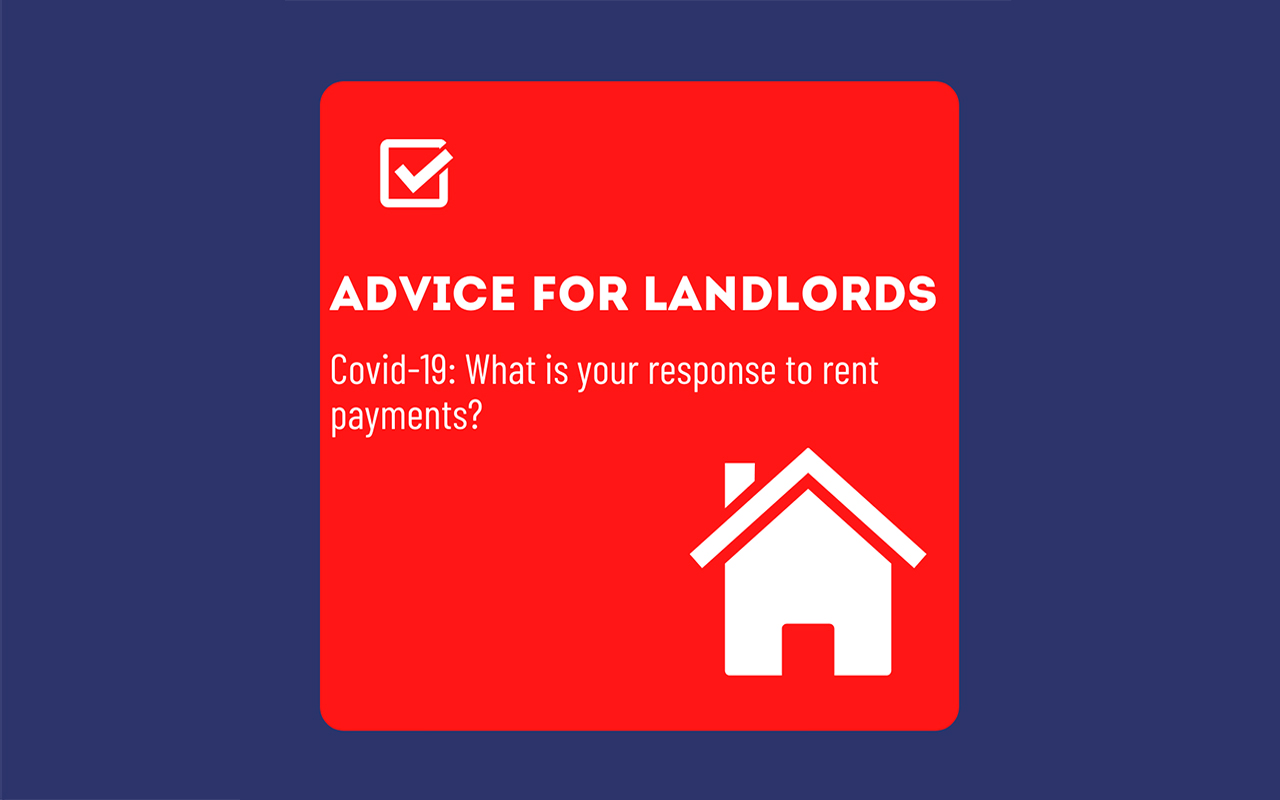Tenant Problems regarding Rent Payments
We have received a large number of enquiries from Landlords at this time regarding rent obligations due to tenants who are unable to pay rents.
As a Landlord, this creates a large number of issues for you in terms of cashflow and particularly so if you have mortgage payments to make. The question of responsibility to lenders is perhaps a slightly different issue and it advisable for you to speak to your lenders at an early stage to see what assistance they are able to offer you in terms of reductions in payments or a payment holiday. The Government is applying quite a lot of pressure to lenders to assist with this and there will be further updates regarding this shortly.
The real issues for you immediately are how to address dealing with your tenant and their payment of rent. It may very well be the case that the tenant is simply unable to pay anything or has asked you for a deferral of rent in whole or in part.
Your Options:
- You can completely defer the payment of rent for an agreed period of time and for the amount to be collected at an agreed later date over a period of months by proportionate payments.
- You can grant your tenant a rent-free period.
- You can agree a rent reduction based on the percentage of the rent for a period of time with an agreement for collection of rent over a period starting at a later date.
You could elect to charge interest on any rent concessions or deferrals. However, if you have a tenant who is already experiencing financial difficulties then charging interest will be of no real benefit.
Insurance Premiums
We have taken the view that tenants’ contributions to insurance premiums which you have to pay and to service charges where you will be incurring liabilities should not be the subject of any deferral or rent-free arrangement. This would mirror the normal position where Leases are granted with a rent-free period. It, however, may be the case that the tenant has absolutely no income and will not be able to pay anything.
Remedies under your Lease
The normal remedies available to a landlord in the event of rent reviews are:
- To issue proceedings for recovery of the payment,
- To charge interest on late payments until made,
- To effect some form of what used to be distraint by entry onto the premises and seizing tenants’ goods to the value of the rent owing or
- Forfeiture either within proceedings for recovery of rent or by peaceable re-entry and forfeiture which subject to very strict rules can be achieved simply by entering the premises and securing them. Do not do this latter remedy yourself!
There are some real observations as to the tactical and commercial sense in enforcing remedies at this time.
Forfeiture
First of all in terms of forfeiture whether by peaceable re-entry or otherwise the Government announced on 23 March 2020 that there would be a three-month moratorium on landlords’ ability to forfeit a Lease. This means that it simply will not be lawful for you to effect a forfeiture during that three-month period. It does not, however, wipe off the debt and so forfeiture would be a possible option at a later stage and the arrears arising during it would count.
Instructing a Bailiff
The distraint-style approach is now governed by the Commercial Rent Arrears Recovery Rules (CRAR). Essentially the good old-fashioned method of arriving at the premises with a bailiff to seize goods is significantly watered down by the new rules. Under CRAR before goods can be seized the tenant has to be given notice of the landlord’s intention to do it. We would recommend that you take advice from a bailiff about the use of CRAR.
Bringing the Tenant’s Obligations to an End
The real issue for us to comment on here for you at the moment is the advisability of seeking forfeiture of a Lease for rent arrears which in some cases you might seek to do to apply real pressure on a tenant.
In the current climate, it is not unreasonable to think that quite a few tenants would be grateful to have the Lease forfeited which would essentially bring their obligations to an end.
Things to Consider with Forfeiture
There are other commercial reasons why you would think seriously about forfeiture which would end the lease:
1. Liability for business rates – whilst the tenant remains as a tenant they will be responsible for business rates of the premises. If the premises are vacant and have been taken back by the landlord either by agreement or by a forfeiture liability, then the liability for the rates will fall to the landlord. At this point not only are you receiving no rent but also you will incur an additional liability.
2. Avoid accepting a surrender – With regard to rates and everything else the landlord should avoid falling into the trap of agreeing formally or informally to take back the premises such as by taking keys from a tenant – the effect of that is a surrender of the Lease automatically and again the Lease and liabilities under it will come to an end.
3. Insurance issues – If premises are forfeited they will be empty. There could well be issues with your insurance. First of all many policies will require you to notify an insurer if premises are unoccupied and insurers may then insist on additional security, ensuring the water is turned off and potentially payment of an additional premium by the landlord.
4. Security/squatters – Vacant premises are going to pose security risks. There is an inevitable risk of squatters and then the costs of eviction and also the costs involved with protecting the premises with additional security and boarding- up.
5. Check your insurance – You would be well advised to check with your insurers now as to whether there are any notification requirements if the tenant remains as a tenant but the premises are closed and not occupied during the Government’s restriction on trading. This may trigger an additional payment that you might be able to pass on to the tenant but it elevates the risk that your insurers notify no o risk any chance of insurers saying that because they have not been notified the premises are uninsured. The consequences of that are obvious.
Template Letter
Once you have decided which option works best for you, you will need to notify your tenant in writing.
Attached is a specimen template letter which you can adapt to your requirements decision as to what you will do with the tenant our attached specimen letter will be a useful template for you to use.
The attached template is in a letter form rather than a formal document so that you can arrange for it to be signed quickly and easily. It has been drafted to include a range of clauses for you to select to your circumstances.
These arrangements really are personal between you and your present tenant and that anything conceded by the letter will not constitute a Variation of the Lease. The Lease will continue to have full force and effect, including remedies for charging interest in the future or potentially even forfeiture.
If you do require specific advice in relation to your obligations and options as a Landlord, or would like a copy of our template letter, please do not hesitate to contact us with your queries at hello@nrglaw.co.uk.

David Langley
Consultant Solicitor
David is a highly experienced commercial property solicitor and throughout his career has handled portfolio and site acquisitions, property disposals and acts for Landlords and Tenants in commercial leases and commercial property management.
